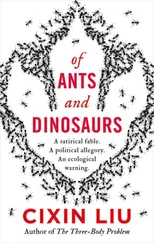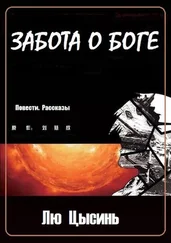“Hah! Now that’s a thrilling game!” Davey said, laughing. Scott whispered to him that since the Bradley weighed fifty-seven tons, heavier than both the Chinese Type 99 and Russian T-90, and could go from 0 to 30 kph in just seven seconds, it wouldn’t be outclassed in wall tumbling, so he didn’t object to the event.
“There’s an even more thrilling tank game. Foot soldiers versus tanks!” Marshal Zavyalova said.
“Awesome!” Lü Gang exclaimed, and everyone else agreed.
“There’s bound to be lots more fun tank games, but let’s set out these for the time being. We can add new ones as we please,” Yagüe said, writing down the events.
“Jet fighters!” Scott shouted.
No one objected, but someone asked whether the event would be divided into two parts—air-to-air missiles, and guns.
Marshal Zavyalova shook her head. “I don’t see the point. Kids aren’t proficient at flying yet, and it’s tough enough to manage dogfights. Add in extra restrictions, and I’m afraid it won’t be any fun.” And so the event was decided upon.
“Infantry with light weapons,” called out Huahua.
“Hmm. That’s a basic event. But it needs to be subdivided. First, define light weapons,” Marshal Zavyalova said.
“Anything under twenty millimeters.”
“Then maybe we should first divide into two games, fortified positions and charges. In the first, the two sides shoot at each other from within their fortifications. The second is like the tank-charge game, where the two sides advance toward each other and open fire when they reach a certain distance. That distance… doesn’t need to be set right now.”
“It’s like a Russian-style pistol duel,” someone murmured.
“Armored helicopter duels!” Davey shouted.
China and India opposed that game, and Japan remained neutral, but with the US, Russia, and the EU in support, the event was approved.
“Grenades!” Huahua shouted. “Oh, right. That should be a subdivision of the infantry and light weapons.”
“Why are you only pitching that backward stuff?” Davey asked the Chinese children.
“Why are you only pitching the advanced stuff?” Huahua asked back.
Again, it was Yagüe who smoothed things over. “It’s all good. Everyone has the same goal, to play fun games. You’ve got to be understanding. If everyone only picks their strong events and rejects their weaker ones, how are we going to have games to play?”
“Grenades are a basic weapon. Why can’t they be included?” Lü Gang asked.
“Fine. Put them in, then. Don’t imagine we’ll be pushovers, though,” Davey said caustically.
“We should also subdivide grenades into fortifications and charges,” Marshal Zavyalova said. “And with basic weaponry in mind, have you considered artillery?”
As they realized the potential, the children shouted out different artillery games.
“Five-kilometer artillery fights!”
“Ten-kilometer large-caliber!”
“Thirty-kilometer rockets!”
“Self-propelled rockets against a moving target! Heh, on the Antarctic plain that’ll be like a sea battle.”
“Mortars! Who can forget mortars?”
“That’s right. Mortars at close range. And they can be mobile, too. That’ll be tons of fun.”
Scott cut them all off, saying, “Let me make a suggestion. Contests at ranges beyond five kilometers can take advantage of aerial reconnaissance and fire correction.”
“Opposed! That makes the game too complicated, and increases the chance of fouls,” Lü Gang said.
“In favor! It makes the game more interesting,” Prime Minister Green said.
“Stop!” Yagüe rapped the helmet loudly. “I said before, technical details are up to the task force to decide.”
When Yagüe finished recording the artillery games, Davey jumped to his feet. “You’re all interested in quite a lot of events. I’ll suggest another one. Bombers and ground-based air defense!”
Yagüe raised an eyebrow, considering the question. “The game would be like tanks versus infantry. The two sides would be unbalanced, so you’d need to swap roles, which increases the number of heats, and complicates administration and judging. We ought to minimize this sort of game.”
Huahua chuckled, and shot Davey a grin. “I’d wager that President Davey didn’t consider the role-swapping issue. He probably only imagined that the US would do the bombing, and someone else would do the defense. Is that right?”
Davey slapped his head. “Uh, yeah, I overlooked that part.”
“Cognitive inertia. So how about it, do American kids want our H-20 and the Russians’ Tu-22M to bomb their defenses?”
“Uh… since the chairman just mentioned the administration and judging difficulties, we can just take a pass on this event.”
Scott interjected, “We can add a ship-to-shore game, like landing versus land defense.”
“That’s also incredibly hard to organize and administer. And it’ll take an awfully long time. And it might not be any fun. I say forget it,” Marshal Zavyalova said. Yagüe and the other children followed with similar sentiments, and the game did not pass.
“This one ought to work: Missile versus missile!” Davey suggested, undaunted.
Ilyukhin nodded approvingly. “Great. An excellent game. You can subdivide it into close and midrange guided missiles, and ICBMs.”
“Ooh, ICBMs!” exclaimed Davey, waving his hands wildly. “This is the best game so far!”
“But no using TMD or NMD,” Ilyukhin said coolly.
“What? Of course we need to use NMD and TMD!” Scott shouted.
“But most of the permanent member countries don’t have them, so it doesn’t fit the package principle.”
“Who cares! We’re going to use them. We support this a hundred and twenty percent! Otherwise, we’re pulling out of the games,” Davey shouted while his arms flailed about uncontrollably.
“Fine. Use them if you want,” Lü Gang said with a dismissive wave.
“NMD? They can’t even get Aegis going.” Zavyalova punctuated her criticism with a snort of contempt.
Davey let out a long breath. “Good. Now let’s move on.” Then he sat down and looked smugly at the other children.
Huahua raised a hand. “Land mines!”
“Interesting. How do you play?” asked the children.
“Opposing teams set up two minefields over an area to be determined by the task force. In the center of each field is the team flag. The first to clear a path to the opposing team’s flag is the winner.”
Davey curled his lips and said sarcastically, “Fine, give the kindergartners something to play. Write it down, Mr. Chairman.”
Now a head of state from an island in the Pacific stood up. “Some of the smaller countries want me to say a few words for them. You’ve got to give us at least a few chances to play.”
“Can’t you play with the rest of us in those traditional events, the ones the Chinese kids proposed?” Davey asked.
“You’re not getting it, Mr. President. Take my country, for example. Right now we have just one company on Antarctica, fewer than two hundred troops, and even in the simplest infantry game, I estimate we’ll lose combat effectiveness after just one round.”
“You all can propose other games.”
“I’ve got one,” said Lê Sâm Lâm, the prime minister of Vietnam. “Guerrilla war!”
“Wicked! How do you play?”
“The two opposing teams attack each other’s base using a small guerrilla force. The specific rules are as follows—”
“Shut up!” Davey shouted, leaping up and banging the table. “You ought to be ashamed of yourselves for proposing such a vile idea!”
“That’s right. You should be ashamed!” Green joined in.
“It’s… it’s going to be a little disruptive,” Yagüe said to Lê Sâm Lâm. “Back at the meeting in Washington, we reached a consensus that country’s bases are sacrosanct. Your proposal disturbs the very foundation of the games.”
Читать дальше
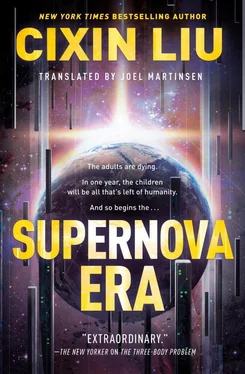



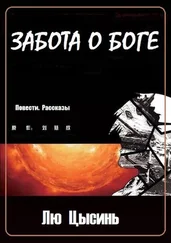

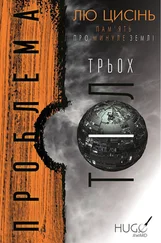
![Лю Цысинь - Эпоха сверхновой [litres]](/books/393110/lyu-cysin-epoha-sverhnovoj-litres-thumb.webp)
